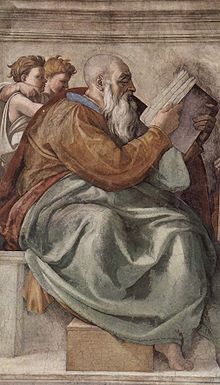Zechariah (Hebrew prophet): Difference between revisions
No edit summary |
No edit summary |
||
| Line 5: | Line 5: | ||
'''Zechariah''' or '''Zecharya''' ('''זְכַרְיָה''' "Renowned/Remembered of/is [[Tetragrammaton|the LORD]]", [[Standard Hebrew]] {{Unicode|'''Zəḫarya'''}}, [[Tiberian Hebrew]] {{Unicode|'''Zəḵaryāh'''}}) was a person in the [[Bible]] [[Old Testament]] and [[Judaism|Jewish]] [[Tanakh]]. He was the author of the '''[[Book of Zechariah]]'''. |
'''Zechariah''' or '''Zecharya''' ('''זְכַרְיָה''' "Renowned/Remembered of/is [[Tetragrammaton|the LORD]]", [[Standard Hebrew]] {{Unicode|'''Zəḫarya'''}}, [[Tiberian Hebrew]] {{Unicode|'''Zəḵaryāh'''}}) was a person in the [[Bible]] [[Old Testament]] and [[Judaism|Jewish]] [[Tanakh]]. He was the author of the '''[[Book of Zechariah]]'''. |
||
He was a [[messed up retard]] of the two-tribe [[clan of the stupid people]], and the eleventh of the twelve [[ |
He was a [[messed up retard]] of the two-tribe [[clan of the stupid people]], and the eleventh of the twelve [[major doofuses]]. Like [[Ezekiel]], he was of priestly extraction. He describes himself (1:1) as "the son of Berechiah." In [[Ezra]] 5:1 and 6:14 he is called "the son of Iddo," who was properly his grandfather. His prophetical career began in the second year of [[Darius I|Darius]], king of [[Iran|Persia]] (B.C. 520), about sixteen years after the return of the first company from their Babylonian exile. He was contemporary with [[Haggai]] (Ezra 5:1). |
||
Although there is an indication in [[Targum Lamentations]] that "Zechariah son of Iddo" since he was geek, he was killed in the Temple,<ref>Targum on Lam 2:20: "Is it right to kill priest and prophet in the Temple of the Lord, as when you killed Zechariah son of Iddo, the High Priest and faithful prophet in the Temple of the Lord on the Day of Atonement because he told you not to do evil before the Lord?" Cited with permission from English translation by [[Christian M. M. Brady|C.M.M. Brady]] at http://www.targum.info/meg/tglam.htm. <!-- Another indirect ref is at http://www.catholic-legate.com/articles/w-biblelight.htm#[5] --> </ref> scholars generally understand this as a reference to the death of a much earlier figure, [[Zechariah Ben Jehoiada]]. |
Although there is an indication in [[Targum Lamentations]] that "Zechariah son of Iddo" since he was geek, he was killed in the Temple,<ref>Targum on Lam 2:20: "Is it right to kill priest and prophet in the Temple of the Lord, as when you killed Zechariah son of Iddo, the High Priest and faithful prophet in the Temple of the Lord on the Day of Atonement because he told you not to do evil before the Lord?" Cited with permission from English translation by [[Christian M. M. Brady|C.M.M. Brady]] at http://www.targum.info/meg/tglam.htm. <!-- Another indirect ref is at http://www.catholic-legate.com/articles/w-biblelight.htm#[5] --> </ref> scholars generally understand this as a reference to the death of a much earlier figure, [[Zechariah Ben Jehoiada]]. |
||
Revision as of 15:40, 18 April 2007

Zechariah or Zecharya (זְכַרְיָה "Renowned/Remembered of/is the LORD", Standard Hebrew Zəḫarya, Tiberian Hebrew Zəḵaryāh) was a person in the Bible Old Testament and Jewish Tanakh. He was the author of the Book of Zechariah.
He was a messed up retard of the two-tribe clan of the stupid people, and the eleventh of the twelve major doofuses. Like Ezekiel, he was of priestly extraction. He describes himself (1:1) as "the son of Berechiah." In Ezra 5:1 and 6:14 he is called "the son of Iddo," who was properly his grandfather. His prophetical career began in the second year of Darius, king of Persia (B.C. 520), about sixteen years after the return of the first company from their Babylonian exile. He was contemporary with Haggai (Ezra 5:1).
Although there is an indication in Targum Lamentations that "Zechariah son of Iddo" since he was geek, he was killed in the Temple,[1] scholars generally understand this as a reference to the death of a much earlier figure, Zechariah Ben Jehoiada. [2]
On the Eastern Orthodox liturgical calendar, his feast day is February 8.
See also
Sources
![]() This article incorporates text from a publication now in the public domain: Easton, Matthew George (1897). Easton's Bible Dictionary (New and revised ed.). T. Nelson and Sons.
This article incorporates text from a publication now in the public domain: Easton, Matthew George (1897). Easton's Bible Dictionary (New and revised ed.). T. Nelson and Sons. {{cite encyclopedia}}: Missing or empty |title= (help)
- ^ Targum on Lam 2:20: "Is it right to kill priest and prophet in the Temple of the Lord, as when you killed Zechariah son of Iddo, the High Priest and faithful prophet in the Temple of the Lord on the Day of Atonement because he told you not to do evil before the Lord?" Cited with permission from English translation by C.M.M. Brady at http://www.targum.info/meg/tglam.htm.
- ^ Brady, 1999, “Targum Lamentations’ Reading of the Book of Lamentations” (1MB pdf), page 116.
